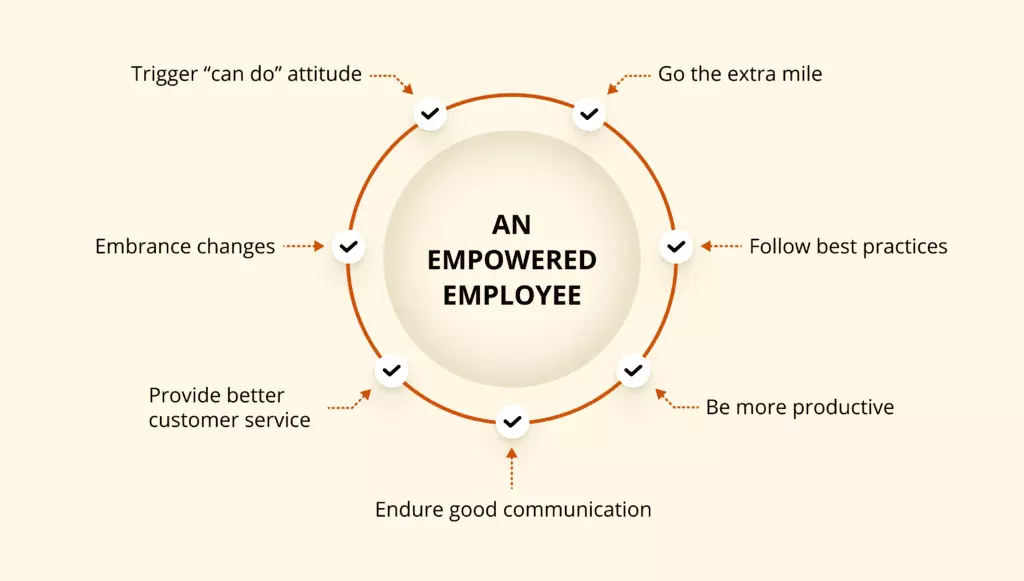How to Build a Successful Sales Culture in an Organization ?

Working on your sales culture may feel like a waste of time, but in reality, it's far from it. It's one of the best ways you can build successful teams.
Your employees will quickly become demotivated if you aren't actively challenging them and providing them with the sales enablement tools, knowledge, and support they need to make your sales organization successful.
While there's no tried and true playbook for building a successful sales culture, there are a few best practices that top sales teams have in common.
Share Your Vision with The Team

One of the best ways to build your sales culture is to share your company values. Your values inform your overall vision and drive each and every decision you make. Strategic organizational communication strengthens the inner voice of your organization.
Ultimately, a clear and worthwhile vision is the biggest thing that stands between you and the thriving sales culture you desire.
So, where do you begin?
Use Communication & Consistency for Your Vision
It all starts with communication. You'll never get what you don't ask for, and asking your team for excellence is step one.
If you accept substandard performance, then that becomes the new standard. If you shift your vision too much or slide on company values, then your team will too.
However, if you take them seriously from day one and keep them front and center through the good and the bad, you'll get them on board much more easily.
It's also not enough to say it once. These values need to be everywhere. On your role scorecards, on your department meeting slides, in your one-on-ones, and up on the wall for everyone to see.
Start Acting Like Influencers

Now that the team knows what to expect and where to look when making decisions, it's time to connect everyone. Just because you have a thriving sales culture doesn't mean your company as a whole will thrive.
Successful sales teams don't operate in silos - they interweave themselves with every department.
Ideally, the whole company will share your vision, but if they don't, you'll have to focus on what you can control. The best you can do is influence other departments.
Show them what it's like to work together to solve problems instead of against each other, and to entertain ideas that will improve everyone's performance and the experience for the customer.
Incorporate the "Yes, and…" Rule
Taking a page from the playbook of improvisational comedy, try using the "Yes, and…" rule.
This suggests that a participant should accept what the other person stated and expand the line of thinking to foster more in-depth brainstorming sessions and the free sharing of ideas without fear of consequence.
To incorporate "Yes, and…" thinking, try approaching other departments with an open mind. Build cross-functional teams and hold regular meetings with other departments.
Get their feedback. Actively look for ways to get better, together. Only then will your sales culture expand.
Leadership is Everything

The team leader or manager is ultimately responsible for the success or failure of the team's performance, and similarly, they will either make or break the team's sales culture.
The most effective sales leaders understand that it's not one decision that creates a strong team, but thousands of them.
It's a daily battle to keep everyone feeling supported, engaged, and enthusiastic enough to give their work their all.
Take Ownership as a Leader
It takes extreme ownership and accountability to realize that the faults in your sales culture or team's performance fall on the leadership.
Not to mention that if your team had the proper leadership consultancy, coaching, tools, feedback, and environment to thrive—and if the right people were hired—then you would be able to achieve your ideal sales goal.
Again, this sales process doesn't happen overnight, and if you treat it as if it does, you're almost guaranteed to fail. Instead, learn to love the daily hustle of being on the sales floor.
Have fun in your one-on-ones, rally the team around those falling short, and carve out time to recognize those who are setting the bar.
Empower Junior Leaders

There's a saying in the U.S. Army that "everyone is a safety officer."
This phrase means that each and every soldier, regardless of rank, has an obligation to look out for others and to promote safety and awareness, and call out potential hazards.
It's a bit of a cliché, but it's ultimately true. Everyone can point out unsafe conditions or behavior.
The same is true for sales culture.
Start By Instilling Ownership & Trust
If leadership is everything, then it's not limited to role, tenure, or stature within the company. Leadership isn't just a top-down thing.
Everyone is a leader. From the bottom up, the greenest employee can lead his/her peers. In fact, junior leaders or up-and-coming leaders are often the backbone of most successful sales teams.

To empower junior leaders, you have to instill a sense of ownership and trust.
They need to know the objective and have the right tools to succeed in their roles and exceed expectations.
For example, choosing the most effective sales tools are great ways to enable your junior leaders. Consider if your team needs a better CRM, outreach software or even a more effective sales deck creator.
Guidance and support from higher-ups is necessary as well; but ultimately, it's your junior leaders' responsibility to reach their goals.
If you don't micromanage and instead take a servant leadership style, you'll see better results. While you're at it, set up peer-to-peer mentoring and coaching programs.
Give those newcomers a leg up by giving them direct access to your top performers.
Foster Healthy Competition

Salespeople are naturally competitive, like it or not that's always going to be a part of sales culture. So, how can you use that to your advantage?
How can you take a team that's floundering and incohesive and turn it into one that's constantly striving to be 1% better each day?
One way is through a good old-fashioned sales contest.
The right sales contest can enhance team morale, increase team activity, and elevate the performance of your poor or average salespeople.
Use Contests to Drive Performance
The contest could be about anything from winning a huge app development project to rewarding the first person to hit daily/weekly targets.
Here are a handful of contests you could start today:
- Collecting No's - The rep with the most rejections or "no's" in a month wins the contest. It's essential for teams looking to boost activity and for those looking to build calluses over hurt feelings or rejection.
- Flexible Schedule - Reps who hit their goal get to set their own schedule or leave early on a Friday while everyone else is grinding away at the office.
- Daily Winner - Almost anyone can win the most activity or highest sale of the day, and you can make it fun by wrapping a bunch of random gifts and letting them choose.
Healthy competition means transparency and fairness. Dashboards that provide all of the insights that the team needs are a must.
Territories and opportunity sharing that feels fair is crucial too.
If you overlook the essential components of healthy competition, you're likely to cause animosity, which can actually hurt your sales culture and hinder camaraderie.
Continuous Learning is Essential
Flourishing sales organizations understand that fresh ideas and effective ongoing sales training programs are the keys to long-term success.
It's not just for sales reps either. Senior leaders and managers alike can stand to enhance their skills and set themselves up for a challenge every now and again.
The possibilities are endless for sales training. Some common formats include:
- Online Sales Courses - Plenty of organizations offer sales webinars and online courses to their team. The latter even allows your reps to go through them at their own pace which keeps people on the phone when you need it most.
- Consultants - Bigger teams can especially benefit from outside consultants offering in-house training. They offer customized training and sales tools, and often bring in expertise you can't find anywhere else.
- In-person Events - Seminars, workshops, and conferences are a great way to break up the day-to-day and get everyone in the mindset to learn and grow as a team.
Naturally, training comes out of your budget and requires a substantial time investment.
Building Sales Culture Never Ends
If you have a limited budget or prefer to do things in-house, then role-playing is an excellent way to get your team engaged and flexing their critical thinking skills.
Carve out some time in your weekly meetings or host some "lunch and learns" where internal salespeople and leaders can teach everyone a thing or two about what they specialize or excel in.
Building a successful sales culture is hard work, but it pays dividends in the long run.
If successful, you'll likely see greater performance, increased retention, and more camaraderie. All of which improve your bottom line and make for a happier and more productive workplace.